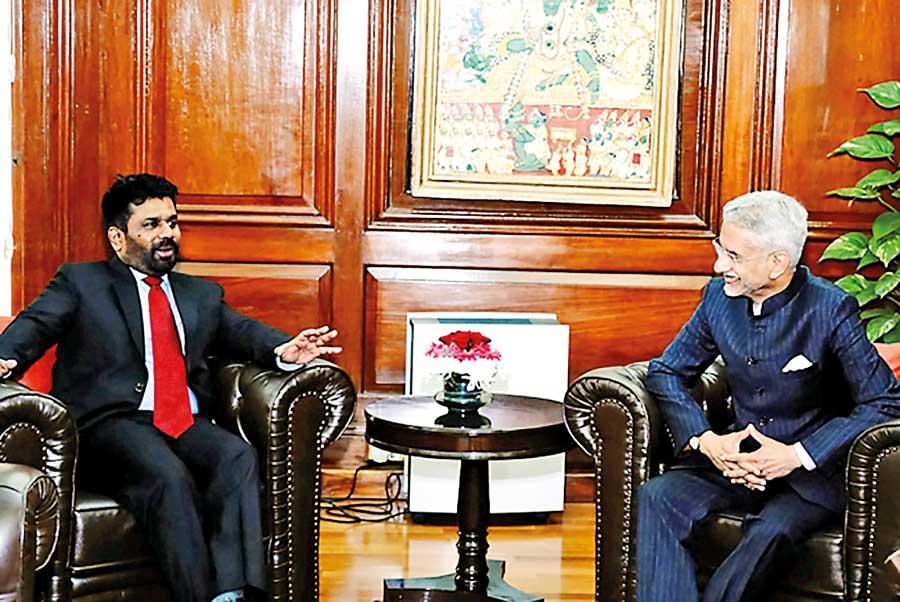Reply To:
Name - Reply Comment

Leader of the alliance National People’s Power (NPP) Anura Kumara Dissanayake (left) during a current visit to India is seen in conversation with External Affairs Minister S. Jaishankar. Dissanayake, who is also the leader of the JVP, is heading a delegation of the NPP to India on a five-day, three-city visit, covering New Delhi, Ahmedabad, and Thiruvananthapuram.
The National People’s Power (NPP), the political alliance led by the Janatha Vimukthi Peramuna (JVP), undertook a tour of India, setting the stage for political development ahead of the presidential elections slated for the last quarter of this year. Its leader, MP Anura Kumara Dissanayake, held talks with both Indian External Affairs Minister Dr. S. Jaishankar and National Security Advisor Ajit Doval on Monday and with Indian Foreign Secretary Vinay Mohan on Tuesday, further elevating the importance of the visit. The NPP Leader Dissanayake led the party delegation, which included senior legislator Vijitha Herath, NPP Secretary Nihal Abeysinghe and executive committee member Prof. Anil Jayantha.
a tour of India, setting the stage for political development ahead of the presidential elections slated for the last quarter of this year. Its leader, MP Anura Kumara Dissanayake, held talks with both Indian External Affairs Minister Dr. S. Jaishankar and National Security Advisor Ajit Doval on Monday and with Indian Foreign Secretary Vinay Mohan on Tuesday, further elevating the importance of the visit. The NPP Leader Dissanayake led the party delegation, which included senior legislator Vijitha Herath, NPP Secretary Nihal Abeysinghe and executive committee member Prof. Anil Jayantha.
After the meeting, Dr. Jaishankar took to ‘X’ and said “Pleased to meet @anuradisanayake, Leader of NPP and JVP of Sri Lanka this morning. A good discussion on our bilateral relationship and the mutual benefits from its further deepening. Also spoke about Sri Lanka’s economic challenges and the path ahead.”
Online media platforms affiliated with the party have interpreted the visit as India’s recognition of Dissanayake’s potential to win the presidential elections
India’s invitation to the NPP leaders was not an arbitrary gesture. The party’s prominence has surged due to its popularity among people after the economic crisis and Aragalaya, which resulted in former President Gotabaya Rajapaksa relinquishing his powers. Since then, foreign envoys, including both former Indian High Commissioner Gopal Baglay and current High Commissioner Santhos Jha, have met with Dissanayake and other leaders of the party. U.S. Ambassador Julie Chung also interacted with the NPP leaders at an official level, indicating that the party has become a force to be reckoned with since polling only three percent of the votes in the 2019 Presidential Elections. Therefore, one cannot merely dismiss this visit as part of India’s regular interaction with political parties across the spectrum in the country. The invitation has been timed against the backdrop of a recent survey by the Institute for Health Policy, a local research institution, which shows that Dissanayake is the most preferred candidate to win the presidential elections.
From India’s perspective, it offers an exploratory opportunity to understand the JVP, a party that has historically advocated an anti-Indian stance. During the 1988/1989 insurrection led by the JVP, the party even referred to the Indian Peace Keeping Force (IPKF) as the ‘Monkey Force’ and advocated for its expulsion from the country. India had not made significant efforts to engage with the JVP in the past because it lacked political strength among the Sri Lankan populace. However, the political landscape has changed significantly, and the JVP’s current visibility and popularity merit international recognition.
The NPP also views the invitation as an opportunity, given its political importance and relevance. Online media platforms affiliated with the party have interpreted the visit as India’s recognition of Mr. Dissanayake’s potential to win the next presidential elections, though nothing can be ruled out in the ever-changing political and social environment.
Rather than solely for economic reasons, India cannot afford to weaken its ties with Sri Lanka, its closest maritime neighbour
India’s ties with Sri Lanka are crucial from cultural, economic, geographical, historical, political, and geostrategic perspectives. Maintaining healthy ties with India is essential for any party in power in Sri Lanka. India’s relevance is particularly prominent today due to its robust economic growth and influence in the international arena. The NPP recognises this reality and has embraced the invitation to liaise with Indian leaders.
Rather than solely for economic reasons, India cannot afford to weaken its ties with Sri Lanka, its closest maritime neighbour. Under Prime Minister Narendra Modi’s leadership, India has shown a proactive approach in the Indian Ocean Region, as reflected in the SAGAR Initiative (“Security and Growth for All in the Region”) launched in Mauritius in 2015. India vigorously pursues its interests in the region and seeks access to the Indian Ocean. Sri Lanka occupies a crucial position in India’s foreign policy, particularly in pillars such as ‘Neighbourhood First’ and ‘Act East.’
Today, India has invested in connectivity projects with Sri Lanka due to its strategic location in the Indian Ocean. It has provided financial assistance, secured energy projects, and proposed infrastructure development plans, including a land bridge and undersea pipelines for fuel distribution. India’s focus on strategic connectivity projects underscores its desire for robust and stable ties with Sri Lanka.
Containment of China is another major aspect of India’s interests in Sri Lanka. India aims to ensure that no government in Sri Lanka leans towards Beijing. Better relations with Sri Lanka are even crucial for India, especially in the context of strained relations with pro-China governments in neighbouring countries like the Maldives.
Like its current outreach to the NPP, the Indian leaders built similar ties with the leaders of the Rajapaksa Government well ahead of the 2019 elections. Ajit Dowal used to meet with Gotabaya Rajapaksa regularly months ahead of the 2019 presidential elections at neutral locations such as Singapore. Those meetings were not officially declared, though. For the first time, India has invited a prospective presidential candidate openly this time.
During the 1988/1989 insurrection the JVP even referred to the Indian Peace Keeping Force (IPKF) as the ‘Monkey Force’
Despite its evolving focus on Sri Lanka, India maintains its principal stance on the Tamil national question, advocating for power-sharing based on the 13th Amendment to the Constitution.
The JVP, a fundamental ally of the NPP, has been opposed to India from the outset. The JVP should clarify its stance and provide insights into its approach towards ongoing connectivity projects with India, including the development of the Trincomalee Oil Tank Farm.